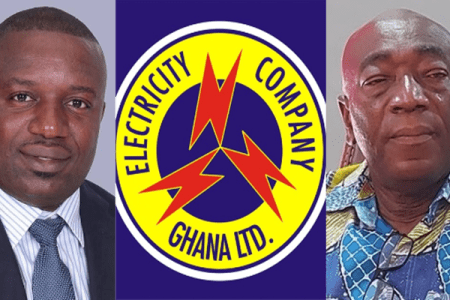The Ghana Trades Union Congress (TUC) has once again reaffirmed its unwavering opposition to any government plan to privatise the Electricity Company of Ghana (ECG), describing such moves as a threat to the country’s strategic interests.
In a strongly worded submission on the 2025 Budget Statement and Economic Policy, the TUC cautioned the government that organised labour will resist any attempt to hand over ECG to private actors, warning that privatisation in any form—direct or disguised—remains unacceptable to the working people of Ghana.
A long-standing stance
The TUC recalled that its opposition to ECG privatisation is not new. In 2017, the union raised similar concerns in its response to the then Akufo-Addo administration’s first budget.
At the time, it declared that it would fight against the sale or private management of ECG or any other key national asset.
“In line with the resolution passed at our 10th Quadrennial Delegates Congress held in August 2016, we will resist any attempt to privatise ECG,” the TUC stated in its new submission.
The union maintains that it sees no distinction between privatisation and private sector participation, arguing that both result in the loss of public control over strategic institutions.
Govt unyielding despite concerns
Despite repeated warnings and protests from organised labour, the TUC believes the government remains “hell-bent” on privatising ECG.
Rather than giving in, the union is doubling down on its stance.
“Our resolve to resist privatisation or private sector participation is at an all-time high,” it said.
Instead of privatisation, the TUC proposes strategic internal reforms—chief among them, removing political interference from ECG’s operations.
Economic Hardships Add Urgency to Concerns
The union’s critique comes at a time when Ghanaians are grappling with a fragile economy.
The TUC noted that although COVID-19 ended more than three years ago, economic recovery remains sluggish.
“Inflation remains high, cost-of-living has skyrocketed, and real incomes have fallen,” it said.
“Unemployment, especially among youth, is rampant, and the national debt is still unsustainable despite the government’s debt exchange programme.”
The TUC attributed many of these challenges to Ghana’s continued adherence to neo-liberal economic policies, which it says have failed the country for the past four decades.
Call for a new economic vision
The TUC expressed disappointment that the 2025 Budget failed to deliver on its promise to reset Ghana’s economic direction.
“We were expecting a new framework that would shift focus to job creation and structural transformation. Unfortunately, the budget fell short,” the statement said.
The union is urging government to work with stakeholders to adopt a new macroeconomic framework—one that centers on employment, equitable resource distribution, and national self-reliance.
“Ghana must derive maximum value from its natural resources and reduce dependence on debt. This will allow the state to fund development sustainably,” it added.
Strategic assets must remain public
The TUC ended its submission with a powerful reminder: strategic national assets like ECG must remain under public ownership if Ghana is to build a resilient and equitable future.
“Privatisation is not the answer. Reform is,” the TUC concluded.
The proposed privatization framework has set the stage for a clash, as both parties remain firm in their opposing positions.
As the government pushes forward with its privatization plans, the tension between PUWU and the administration highlights the broader debate over the future of Ghana’s energy sector.
PUWU made proposals reflecting a strong belief in ECG’s potential for internal reform and sustainable growth, without resorting to privatization.
Govt proposes framework for ECG privatisation
Energy Minister-designate John Abdulai Jinapor, during his vetting by Parliament’s Appointments Committee, outlined a six-month timeline to develop a comprehensive framework for ECG’s privatization.
According to Mr. Jinapor, the move is aimed at enhancing efficiency and improving power distribution across the country.
He explained that a dedicated committee would evaluate global best practices to determine whether a concession model or full privatization would be more suitable for ECG’s operations.
Mr. Jinapor also assured the committee that the process would be transparent and free from political interference.
PUWU reiterates strong opposition
In response to the Minister, a statement issued by its General Secretary, Timothy Nyame, PUWU expressed its unwavering opposition to the privatization of ECG.
The union emphasized that its position on ECG privatization remains unchanged.
“We vividly recall the engagement we had with the previous NDC administration regarding issues of the Power Distributor, ECG. PUWU of TUC wishes to reaffirm that its position on ECG privatization and management remains unchanged and believes the best alternative presented stands as the best for Ghanaians and other stakeholders,” the statement read.
Concerns over political control and rising costs
PUWU raised concerns about the heavy political influence on ECG’s management and the rising input costs that could drive up electricity prices for consumers.
“While the Power Distributor is heavily controlled and managed by politicians, we have continuously expressed our disquiet on the cost of input in running the power sector, which will invariably be factored into electricity pricing,” the union noted.
Call for stakeholder engagement
PUWU stressed the importance of broad stakeholder engagement in addressing the challenges facing the energy sector.
The union also warned against vested interests that may influence the privatization process.
“PUWU of TUC is not unaware of the many interest groups, locally and abroad, when it comes to investment in the power and energy sector.
We are also aware of many who paraded the corridors of power with interests in ECG in the past and have resurfaced to continue their game,” the statement added.
Learning from past experiences
Ghana’s experience with privatizing state-owned utilities offers valuable lessons.
In the past, the government engaged in a public-private partnership (PPP) with Aqua Vitens Rand Ltd (AVRL) to manage the Ghana Water Company.
However, this partnership ended in 2011 after widespread dissatisfaction from workers and civil society organizations, who criticized AVRL’s poor performance.
The government ultimately repossessed the Ghana Water Company, opting not to renew the contract.
The key challenges facing ECG
The Electricity Company of Ghana (ECG) faces numerous challenges that hinder its efficiency and profitability.
These include managerial and governance inadequacies, which negatively affect staff morale and discipline.
Additionally, political interference in the administration of the company further exacerbates its problems.
A significant issue is the non-payment of bills by the Government of Ghana (GoG) and state institutions, particularly the Metropolitan, Municipal, and District Assemblies (MMDAs).
Another critical challenge is the lack of cost-reflective tariffs, as inherent subsidies from the government remain unpaid. Inadequate power generation reduces sales volume and turnover, while transmission capacity constraints impede effective power distribution.
PUWU’s concerns over privatization
PUWU opposes the privatization of ECG, citing several risks.
They argue that a private investor would not prioritize rural electrification, a critical social intervention.
Privatization could also create a virtual private monopoly in energy distribution, posing significant risks in the context of Ghana’s weak regulatory framework.
Other concerns include threats to local content, profit repatriation by foreign investors—which could weaken the cedi—and the likelihood of foreign investors exiting the market at the first sign of economic instability.
PUWU also noted the lack of successful privatization stories in developing or middle-income countries with power distribution networks similar to ECG’s.
The union warns of potential job losses and their associated social impacts, emphasizing that certain aspects of ECG’s operations, such as rural electrification, will always result in losses due to their social rather than economic nature.
PUWU’s proposed solutions
PUWU firmly believes that ECG can be transformed into an efficient and profitable organization capable of meeting its obligations to power producers and service providers without resorting to privatization.
The Union envisions a transformed ECG that generates sufficient funds to pay power producers and other suppliers, ensuring the smooth operation of the energy sector for the benefit of Ghanaians.
This transformation, they argue, can be achieved through disciplined managerial and governance reforms, free from political interference.
PUWU recommends appointing a dynamic and competent leader through a competitive process on a fixed-term contract of five or six years, renewable based on performance.
The Managing Director, under a binding contract with independently verifiable key performance indicators, should have the autonomy to manage the distribution business according to sound business and public service principles.
The union insists that the government must fulfill its obligations by ensuring that Ministries, Departments, and Agencies (MMDAs) pay for the power they consume at regular intervals.
PUWU also highlights the need for realistic, cost-reflective tariffs, arguing that the current high tariffs are driven by the profit motives of private investors.
Recommendations for revitalizing ECG
PUWU proposes that the government address ECG’s leadership challenges by appointing a Managing Director on a performance-based contract.
They also recommend providing the same conditions promised to private investors to create an enabling environment for ECG’s operations.
The union advocates for adequate time, approximately three years, to trial the Strategic Business Unit (SBU) concept introduced in the Ashanti Region.
Additionally, they suggest listing ECG on the Ghana Stock Exchange within five years to raise funds from local sources, such as pension funds, for investments in state-of-the-art technology and equipment.
These investments would aim to reduce waste and improve ECG’s distribution network.
PUWU stresses that it is misleading to attribute all of ECG’s losses to inefficiency.
Social interventions, like rural electrification, are essential components of national development and should not be judged solely by economic indicators.
- Minority urges govt to act swiftly on Bawku security crisis - 12 April 2025
- Utility tariff hikes: Electricity-14.75%, Water-4.02% - 12 April 2025
- Empowering ECG, NEDCO in electricity supply without privatization - 11 April 2025

